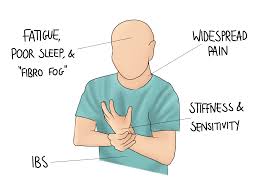
Fibromyalgia is a complex and often misunderstood condition that affects millions of people worldwide. Characterized by widespread musculoskeletal pain, fatigue, and tenderness, it can significantly impact daily life. In this article, we’ll explore what fibromyalgia is, its symptoms, and management strategies, and answer common questions to help you understand this challenging condition.
What is Fibromyalgia?
Fibromyalgia is a chronic condition that causes widespread pain and tenderness throughout the body. While the exact cause is unknown, it is believed to result from abnormal processing of pain signals in the brain and spinal cord. Fibromyalgia is more common in women than men and often coexists with other conditions such as irritable bowel syndrome (IBS), migraines, and autoimmune disorders.
Key Symptoms

- Widespread Pain: A persistent, dull ache that affects both sides of the body and occurs above and below the waist.
- Fatigue: Feeling extremely tired even after a full night's sleep.
- Cognitive Issues ("Fibro Fog"): Difficulty focusing, remembering, or concentrating.
- Sleep Disturbances: Trouble falling or staying asleep, or waking up feeling unrefreshed.
- Sensitivity: Heightened sensitivity to pain, light, noise, or temperature changes.
- Other Symptoms: Headaches, depression, anxiety, and digestive issues.
Managing Fibromyalgia
Although there is no cure for fibromyalgia, several strategies can help manage symptoms and improve quality of life:
- Medications: Pain relievers, antidepressants, and anti-seizure drugs may be prescribed to reduce pain and improve sleep.
- Exercise: Low-impact activities like walking, swimming, and yoga can alleviate pain and boost energy.
- Stress Management: Techniques like meditation, mindfulness, and breathing exercises can help manage stress and reduce symptom flare-ups.
- Therapies: Physical therapy, occupational therapy, or counseling can provide additional support.
- Diet: While no specific diet is recommended, a balanced diet rich in fruits, vegetables, whole grains, and lean proteins can enhance overall well-being.
- Sleep Hygiene: Maintaining a consistent sleep schedule and creating a calming bedtime routine can improve sleep quality.
FAQs About Fibromyalgia
Q: Who is at risk of developing fibromyalgia?
A: Fibromyalgia can affect anyone, but risk factors include being female, having a family history of the condition, and experiencing physical or emotional trauma.
Q: How is fibromyalgia diagnosed?
A: Diagnosis is typically based on medical history, physical examination, and ruling out other conditions. There are no specific tests for fibromyalgia, but a healthcare provider may use criteria such as widespread pain lasting at least three months.
Q: Is fibromyalgia a form of arthritis?
A: No, fibromyalgia is not a type of arthritis. While both conditions involve pain, fibromyalgia does not cause inflammation or damage to joints, muscles, or tissues.
Q: Can fibromyalgia go away on its own?
A: Fibromyalgia is a chronic condition and does not usually go away entirely. However, symptoms can be managed effectively with treatment and lifestyle adjustments.
Q: Are there natural remedies for fibromyalgia?
A: Some people find relief through natural approaches like acupuncture, massage therapy, or supplements such as magnesium and vitamin D. Always consult with a healthcare provider before starting any new treatment.
Q: Does weather affect fibromyalgia symptoms?
A: Many people with fibromyalgia report that changes in weather, particularly cold or damp conditions, can worsen symptoms.
Q: Can fibromyalgia lead to other health problems?
A: While fibromyalgia itself doesn’t cause other conditions, its symptoms can overlap with or exacerbate issues like depression, anxiety, and chronic fatigue syndrome.
Q: Is fibromyalgia linked to mental health?
A: While fibromyalgia is not a mental health disorder, it often coexists with depression or anxiety. The chronic pain and fatigue associated with the condition can impact emotional well-being.

Living with Fibromyalgia
Fibromyalgia can be life-altering, but with the right approach, many people find ways to manage their symptoms effectively. Building a support system, staying active, and working closely with healthcare providers are key to improving quality of life.
Remember, every person’s experience with fibromyalgia is unique, so treatment plans should be tailored to individual needs. If you suspect you have fibromyalgia, consult a healthcare professional for an accurate diagnosis and personalized management plan.
